How Can Councils Help Bees?
12 Actions Councils Can Take
Updated: 25th February 2021
I am sometimes asked How Can Councils Help Bees? What can we do in our communities to help bees?
These are good questions, because you and I can exert a great deal of influence on the activities of councils in our local areas. Many councils are receptive to ideas, many of which will cost little or even save money. So why not ask your council to help bees and pollinators?
3 Reasons Councils Can And Should Help Bees And Pollinators
- They have major control over how large areas of
public land is managed, but remember, they work for you!
- The cost of helping the bees can be negligible – whilst the cost of not doing so could be very high ultimately, not only in terms of the loss of pollination services for the growing of food, but also the loss of biodiversity for future generations.
- We are not only talking about the loss of bee species here, but the potential demise of flower landscapes, and the inability of plants, trees, and shrubs to produce fruit and seeds upon which birds, mammals and other creatures may depend (directly or indirectly).
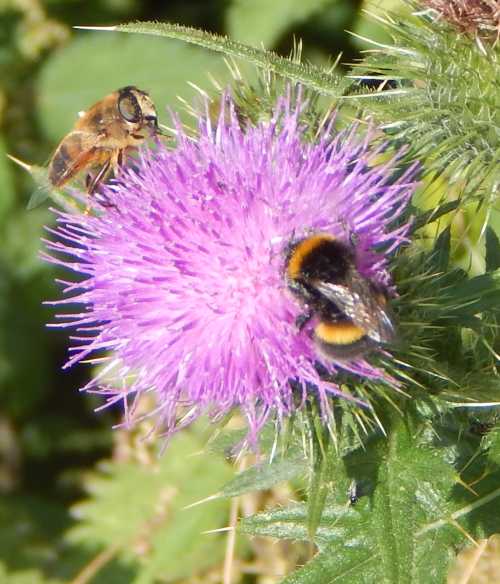 Bumble bee and hover fly on thistle.
Bumble bee and hover fly on thistle.
How Can Councils Help Bees And Other Pollinators?
In a nutshell:
- by creating and preserving bee-friendly habitats
- by cutting out pesticide use
- by encouraging education and awareness.
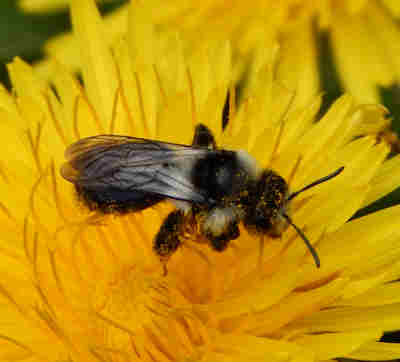 Ashy mining bee on dandelion.
Ashy mining bee on dandelion.
12 Specific actions councils could take to preserve pollinators
- Create a local ‘Pollinator
Protection Plan’ – with specific actions they themselves, and any sub-contractors
they pay on our behalf (to manage land and planting schemes in public spaces)
must implement.
- Reduce mowing of roadside
verges, and instead, designate them ‘Pollinator Verges’ (or even ‘Bee Roads’!) and actively create and link up pollinator corridors to
wildflower meadows and habitats. Having
regularly phoned my local council over the last few years, I can tell you, the
message has got through! I have
encouraged others to do the same. Our
local council has significantly reduced mowing of verges as a result. Be sure to phone up your council and praise them too, when they get it
right. Also, do be aware that there are
sometimes genuine reasons why a roadside verge must be mown – for example, to
maintain visibility at road junctions etc - in such scenarios, clover is very useful. Leave country lanes used by pedestrians left unmown, instead of the obsession with close cropped, tidy (and sterile) verges.
- Replace low pollinator value bedding plants in formal planting schemes and containers in towns, with flowers of value to bees and other pollinators.
- Allow areas of waste land, brown field sites, derelict and ruined sites to become a home to pollinators. At such as site close to my home, bumble bees, solitary bees, honey bees, and a wide range of butterflies, moths and hoverflies can be seen feeding on a range of flowers, which includes red and white clover, bird's foot trefoil, knapweed, ox eye daisy, various mallow, rosebay willow herb, buttercups, ragwort and more.
- Commit to creating a specific pollinator garden, or designating a space for a pollinator garden to which members of the public can donate bee-friendly plants. These could even be stretches of grass outside public buildings, such as libraries.
- Preserve hedgerows and trees for bees and other wildlife. Read about the importance of trees and hedgerows for bees.
- Link up with other councils in neighbouring districts to share ideas and increase pollinator range.
- Share educational resources with schools - there is no need to create new materials - many resources already exist!
- Identify and protect areas where vulnerable species of bees and other pollinators exist.
- Cease the use of insecticides if currently using them on planting schemes lawns and public spaces.
- Adopt an organic policy for sourcing and growing plants for their planting schemes.
- Encourage local businesses to participate in creating bee-friendly spaces where possible.
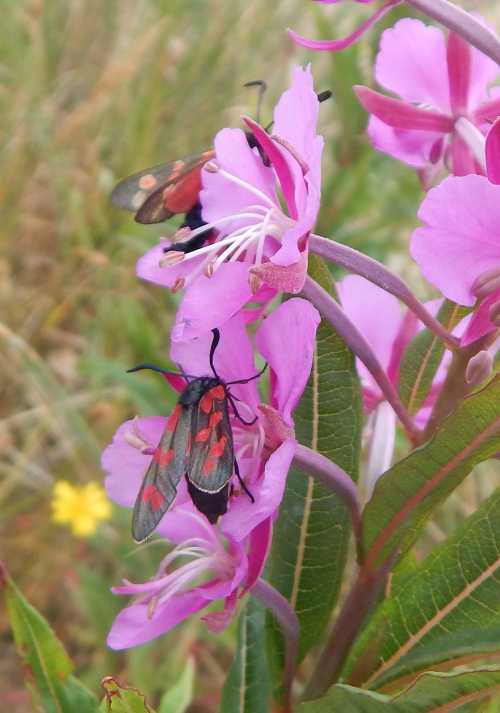 Burnet moths on rosebay willowherb.
Burnet moths on rosebay willowherb.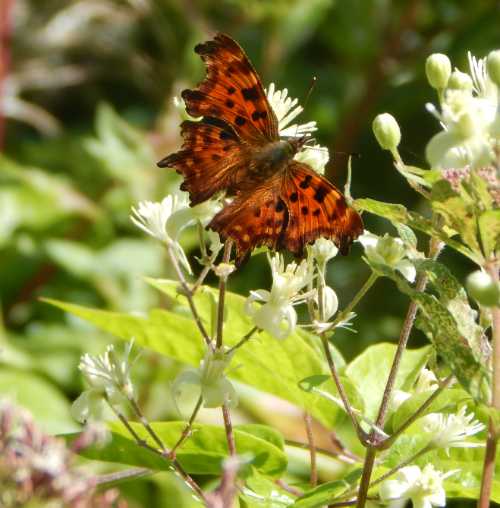 Comma butterfly on old man's beard.
Comma butterfly on old man's beard.
A note about wild flower verges
It's a fact that wildflower verges trap litter more easily than neatly mown ones. The sight of litter can cause the public to phone in and complain. Anything you can do (such as speaking to your school and the local radio station) to discourage litter throwing will be a real help.
Also, give positive feedback for the positive actions your council do take, and asking others to do the same.
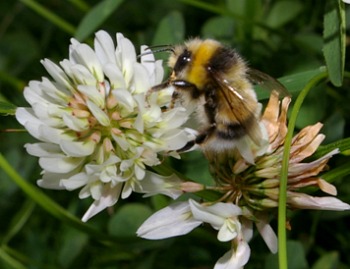 Bumble bee on clover.
Bumble bee on clover.